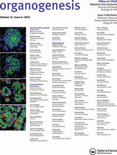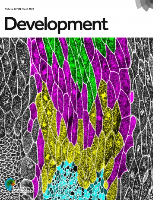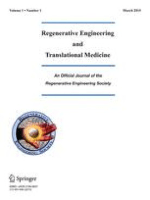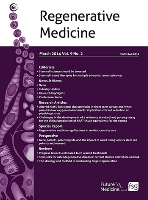
Organogenesis
metrics 2024
Transforming Understanding in Regenerative Medicine.
Introduction
Organogenesis is a leading journal published by Taylor & Francis Inc, dedicated to advancing the field of developmental biology and regenerative medicine. With an ISSN of 1547-6278 and E-ISSN 1555-8592, this journal spans an extensive research scope that includes embryology, transplantation, and biomedical engineering, distinguishing itself as a crucial platform for researchers and practitioners alike. Its impact is reflected in its performance across various categories in 2023, earning Q3 rankings in Biomedical Engineering and Embryology, Q4 in Developmental Biology, and Q2 in Transplantation, showcasing its reputable standing among peer journals. Moreover, with Scopus rankings indicating strong positioning in the fields of medicine and biochemistry, Organogenesis is essential for those looking to publish or stay updated on pioneering research. The journal facilitates rigorous peer-review and offers a forum for disseminating innovative findings, making it an invaluable resource for academics, professionals, and students committed to understanding the complexities of organism development.
Metrics 2024
 0.46
0.46 1.60
1.60 2.50
2.50 61
61Metrics History
Rank 2024
Scopus
IF (Web Of Science)
JCI (Web Of Science)
Quartile History
Similar Journals

IN VITRO CELLULAR & DEVELOPMENTAL BIOLOGY-ANIMAL
Exploring the Depths of In Vitro DevelopmentIN VITRO CELLULAR & DEVELOPMENTAL BIOLOGY-ANIMAL, published by SPRINGER, is a pivotal journal in the fields of cell biology and developmental biology, focusing on in vitro studies that enhance our understanding of animal cellular mechanisms and development. With an ISSN of 1071-2690 and an E-ISSN of 1543-706X, this esteemed journal offers a platform for researchers to present their findings and contribute to the body of knowledge necessary for advancements in biological sciences. As a recognized publication, it holds a 2023 category quartile of Q4 in Cell Biology and Developmental Biology, and Q3 in miscellaneous Medicine, reflecting its competitive position yet inviting critical submissions that can span multidisciplinary approaches. Though currently not open access, it serves as an essential resource for professionals, researchers, and students dedicated to unraveling the complexities of cellular processes in an ever-evolving field. The journal has been continuously published since 1986, signifying its long-standing commitment to fostering scientific discourse and innovation.

Frontiers in Cell and Developmental Biology
Exploring the intricate dance of development and biology.Frontiers in Cell and Developmental Biology is a leading open-access journal published by FRONTIERS MEDIA SA, dedicated to advancing the understanding of fundamental biological processes at the cellular and developmental levels. Since its inception in 2013, the journal has positioned itself as a cornerstone of research in its field, achieving esteemed Q1 quartile rankings in both Cell Biology and Developmental Biology for 2023. With a robust Scopus ranking of #13 out of 82 in Developmental Biology and #67 out of 285 in Cell Biology, it represents a vital platform for innovative research and scholarly discourse. The journal provides a comprehensive and accessible avenue for researchers, professionals, and students alike to share high-quality findings and insights into cellular mechanisms and developmental processes, fostering collaboration and knowledge exchange in the global scientific community. Based in Lausanne, Switzerland, Frontiers in Cell and Developmental Biology is committed to open science, ensuring that all articles are freely accessible to the public, thereby broadening the impact of research in the biological sciences.

DEVELOPMENT
Unveiling the complexities of life through rigorous research.DEVELOPMENT is a preeminent journal published by COMPANY BIOLOGISTS LTD, headquartered in the United Kingdom. With an ISSN of 0950-1991 and an E-ISSN of 1477-9129, this esteemed journal has been at the forefront of the fields of Developmental Biology and Molecular Biology since its inception in 1987. Recognized for its rigorous peer review process and high-caliber research, DEVELOPMENT holds an impressive Q1 ranking in both disciplines as of 2023, underscoring its pivotal role in advancing scientific understanding. The journal is particularly noted for its contributions to the understanding of developmental processes, their molecular underpinnings, and their implications in health and disease. With a significant impact factor, DEVELOPMENT aims to disseminate groundbreaking research that inspires novel insights and future explorations within the biological sciences, making it an essential resource for researchers, professionals, and students alike. The journal also maintains accessibility for its readership, ensuring that significant research findings reach those who can apply and build upon them.

Regenerative Engineering and Translational Medicine
Pioneering Insights in Regenerative HealthRegenerative Engineering and Translational Medicine is an esteemed academic journal published by Springer Heidelberg, focusing on the interdisciplinary fields of biomaterials, biomedical engineering, and cell biology. With an ISSN of 2364-4133 and an E-ISSN of 2364-4141, the journal has carved a niche for itself since its inception in 2015, showcasing cutting-edge research that bridges the gap between scientific findings and practical applications in regenerative medicine. As a recognized platform in its field, it is currently positioned within Q3 quartiles in biomaterials, biomedical engineering, and medicine (miscellaneous), with a Scopus ranking that reflects its growing influence among peers. The journal aims to disseminate high-quality, peer-reviewed articles that highlight advancements in regenerative engineering, further advancing both theoretical and applied research. Scholars and practitioners seeking to stay at the forefront of the ever-evolving landscape of regenerative health solutions will find invaluable insights and innovations within these pages. Join a community of leading thinkers and explore the journal's comprehensive research contributions, which are crucial for fostering partnerships between academia and industry in the quest for transformative medical solutions.

Cells & Development
Connecting Disciplines to Propel Developmental DiscoveriesCells & Development is a premier journal published by Elsevier, dedicated to advancing the field of Developmental Biology. With an ISSN of 2667-2901 and an impressive Q2 ranking in its category for 2023, the journal endeavors to provide a platform for high-quality research articles that explore cellular mechanisms, developmental processes, and molecular interactions that underpin growth and differentiation. Based in the Netherlands, Cells & Development not only emphasizes the importance of innovative experimental approaches but also encourages interdisciplinary contributions that bridge the gap between basic and applied science. As an Open Access publication, it ensures that research findings are readily accessible to a global audience, significantly enhancing visibility and impact. The journal's commitment to scholarly excellence makes it an essential resource for researchers, professionals, and students aiming to contribute to the dynamic field of developmental biology.

Russian Journal of Developmental Biology
Diving deep into the dynamics of development.The Russian Journal of Developmental Biology, published by PLEIADES PUBLISHING INC, serves as a significant platform for researchers and professionals engaged in the field of developmental biology. With the ISSN 1062-3604 and E-ISSN 1608-3326, this journal focused on intricate biological processes and dynamic developmental mechanisms from 2005 until 2017. Although its coverage is currently discontinued in Scopus, it remains notable for its contribution to understanding the pivotal roles of biochemistry and molecular genetics within the context of development. As a publication situated in the competitive quartiles of the field and boasting an influential Scopus rank of #77 out of #78, it has made a unique mark in developmental studies. Researchers and academics seeking to enhance their knowledge of historical advancements in the discipline will find the journal a valuable resource, even as it navigates the transition away from active publication.

Journal of Stem Cells & Regenerative Medicine
Connecting Knowledge to Practice in Regenerative MedicineThe Journal of Stem Cells & Regenerative Medicine is a leading publication dedicated to the advancing field of stem cell research and regenerative medicine. Established in India and published by JOURNAL STEM CELLS & REGENERATIVE MEDICINE, this Open Access journal has been available since 2007, providing researchers and practitioners with free and unrestricted access to high-quality articles. With an ISSN of 0973-7154, the journal is indexed in Scopus, featuring a wide array of topics and insights into biochemistry, biotechnology, cell biology, and molecular biology, as denoted by its relevant quartile rankings. This journal is committed to bridging the gap between laboratory research and clinical applications, making significant contributions to the scientific community. The convergence of innovative studies from 2010 to 2024 positions it as an invaluable resource for those looking to stay at the forefront of stem cell and regenerative medicine research.

International Journal of Stem Cells
Connecting Researchers to Groundbreaking Stem Cell ScienceThe International Journal of Stem Cells is a distinguished peer-reviewed journal dedicated to advancing the field of stem cell research. Published by the Korean Society for Stem Cell Research, this journal has established itself as a vital source of high-quality research since its inception in 2008. Operating under the ISSN 2005-3606 and E-ISSN 2005-5447, the journal caters to a global audience, featuring works that span a diverse array of topics within Cell Biology and Developmental Biology. It is noteworthy that as of 2023, the journal is ranked Q3 in Cell Biology and Q2 in Developmental Biology, highlighting its growing influence and credibility in the scientific community. Given its commitment to facilitating open scientific communication, it is crucial for researchers, professionals, and students to engage with the rigorous research published in this journal as it profoundly impacts the understanding and application of stem cell science. With accessibility to a wealth of innovative studies, the International Journal of Stem Cells remains an indispensable resource for anyone interested in the transformative potential of stem cell research.

Annual Review of Cell and Developmental Biology
Elevating Understanding in Cell and Developmental BiologyThe Annual Review of Cell and Developmental Biology, published by Annual Reviews, stands as a premier journal in the fields of cell biology and developmental biology. Established in 1995, this influential journal has continuously provided comprehensive and critical reviews that synthesize the latest findings in these vibrant research areas, catering to the interests of researchers, professionals, and students alike. With an impressive impact factor, the journal ranks in the top quartile (Q1) for both Cell Biology and Developmental Biology, boasting remarkable Scopus rankings—#1 in Developmental Biology and #22 in Cell Biology. This emphasizes its significance and authority within the academic community. Although the journal does not operate under an open-access model, it remains a crucial resource for those seeking to stay at the forefront of scientific discoveries and theoretical advancements. The Annual Review of Cell and Developmental Biology continues to solidify its status as an essential platform for sharing knowledge and stimulating scientific inquiry.

Regenerative Medicine
Charting New Territories in Regenerative MedicineRegenerative Medicine, published by Taylor & Francis Ltd, is a pivotal journal within the field of biomedical research, focusing on the innovative advances in regenerative and restored functions in human health. With an ISSN of 1746-0751 and an E-ISSN of 1746-076X, this esteemed journal boasts a commendable impact factor within its categories, notably holding the Q2 status in Embryology and Q3 in Biomedical Engineering as of 2023. Covering a broad spectrum of topics from stem cell research to tissue engineering, it serves as a crucial platform for interdisciplinary collaboration among researchers, professionals, and students dedicated to the regeneration of tissues and organs. Given its comprehensive scope from 2006 to 2024, the journal continues to attract high-quality manuscripts that advance the frontiers of knowledge in regenerative medicine. Researchers and practitioners alike are encouraged to engage with the latest findings and methodologies disseminated in this vital publication.